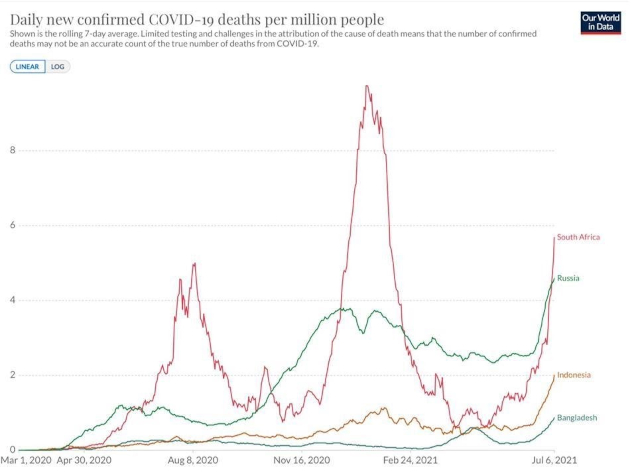[Photo by Wesley Tingey on Unsplash]
Good morning,
In The Third Pillar: How Markets and the State Leave the Community Behind, Raghuram Rajan shares an interesting anecdote from his days working as economic advisor to the Indian government. It throws some light on how some of the most efficient bureaucrats survive the labyrinthine system and get things done, it also highlights a deeper point.
Rajan writes: “When I worked for a while at the Indian Finance Ministry as the chief economic adviser, I was shocked by the heavy paper files that came across my desk—shocked first that we still used paper files in the twenty-first century, and second at the amount of back papers I had to read to understand the note tagged on to the front of each file that required my comments and signature. Once I commented and signed, of course, my comments would become required reading for the next recipient of the file.
“As I complained about this to a veteran bureaucrat, he gave me a simple solution backed by impeccable logic and experience: ‘Spend the least time on the thickest files. They are issues going nowhere, which circulate back and forth across desks, with everyone wasting each other’s time by adding yet more comments. That is why they are so thick. Devote all your time to the thin files. Those are fresh issues where a cogent opinion may actually make things happen.’
“He was right but there is a broader message here. India needs to drop the thick files, and focus more on the thin files. The state can do more by trying to do less.”
This advice might not strike a chord at a time when we expect the state to go the extra mile to solve the health, humanitarian and economic crisis facing the country. Yet, one important question to ask is what’s stopping the state from doing that?
In this issue
- A crisis in Uganda
- Are we prepared enough for a third wave?
- Shakespearzoned (Word of the Day)
A crisis in Uganda
An essay by Mohammed Lamorde, head of the global health security program at Makerere University in Kampala, Uganda, got our attention right away. It was a reminder and a plea to the rest of the world, India included, that his country is running out of time. And this, in spite of their government having done everything right to combat Covid. But the world has let them down.
“Despite limited resources, Uganda was running a highly successful Covid-19 response, reporting fewer cases and deaths than other countries of similar population size.
“But once variants of the coronavirus were detected in Uganda, it was clear that the country needed to prepare for the worst. The Delta variant, which is more transmissible, is now circulating here. There is a huge surge in Covid-19 cases, with hospital treatment units going from nearly empty to full within days.
“In March 2021, Uganda began a vaccination program that aimed to eventually reach 50 percent of the population despite limited vaccines. The country, which has a population of around 44 million, received just 864,000 doses of the AstraZeneca vaccine through Covax, the World Health Organization’s initiative to pool vaccine resources, and 100,000 from India… Doses from the first batch were quickly exhausted because of increasing demand, and the vaccination plan was interrupted. Vaccination restarted in late June with only 175,200 doses available from Covax via France, primarily reserved for people due for their second dose.”
He goes on to make the point that India has stopped exporting vaccines to meet its domestic requirements. And then there are countries with abundant stocks that have started to donate. However, he says that the emergence of the phrase “vaccine diplomacy” is concerning. “While humanitarian on its surface, it represents a political rather than science-based effort.”
Dig deeper
Are we prepared enough for a third wave?
South Africa is facing a third wave. The chart below, tracing deaths per million people, shows how the second wave was worse than the first, and the third is threatening to follow the path of the second.

This should be reason enough for India to prepare for a third wave.
How prepared are we?
A report by IndiaSpend’s Tanvi Deshpande, who travelled to Nandurbar district in Maharashtra, one of the better performing states in the country, indicates rural areas are struggling with lack of infrastructure, medicines and healthcare workers.
Deshpande writes: “The Union health ministry's standard operating procedure (SOP) on Covid-19 containment and management, released on May 16, 2021, has special guidelines for peri-urban, rural and tribal areas. These guidelines should apply to Nandurbar, a predominantly tribal district. The SOP places critical pandemic responsibilities on PHCs [public health centres], including the supervision of Covid care centres for asymptomatic and mildly symptomatic cases. If need be, primary centres are also expected to transform into Dedicated Covid Health Centres (DCHC) with oxygen support for moderate Covid-19 cases.
“However, when we visited five PHCs and three sub-centres in three Nandurbar talukas, we found basic infrastructure missing and protocols, including drugs inventory management, in tatters. We found expired drugs in three of five PHCs including one where injections used to treat an adverse reaction to Covid-19 vaccines were well past their expiry date. These injections are part of an Adverse Event Following Immunisation (AEFI) kit prepared and kept ready at vaccination centres.
“When questioned, medical officers heading the PHCs told us that they are all struggling with an acute staff shortage, especially pharmacists who are supposed to monitor drug inventories.”
Dig deeper
Shakespearzoned (Word of the Day)

(Via WhatsApp)
Found anything interesting and noteworthy? Send it to us and we will share it through this newsletter.
And if you missed previous editions of this newsletter, they’re all archived here.
Bookmark Founding Fuel’s special section on Thriving in Volatile Times. All our stories on how individuals and businesses are responding to the pandemic until now are posted there.
Warm regards,
Team Founding Fuel
(Note: Founding Fuel may earn commissions for purchases made through the Amazon affiliate links in this article.)

